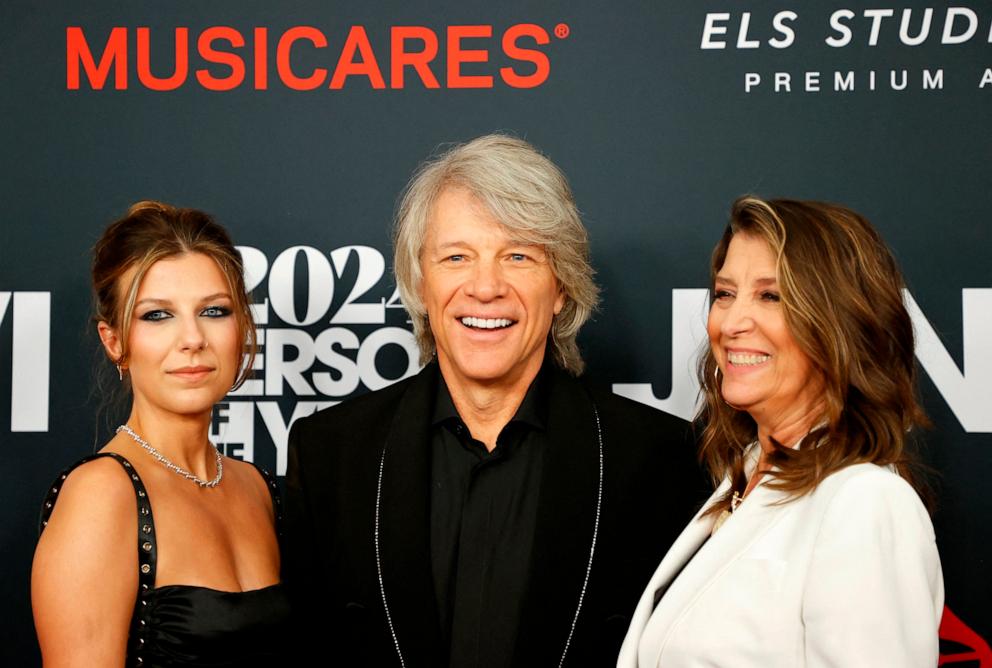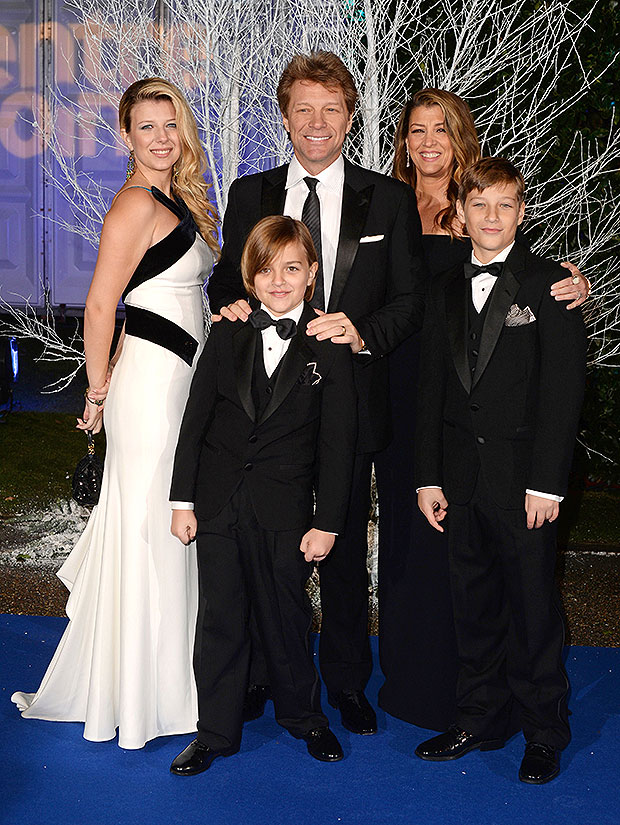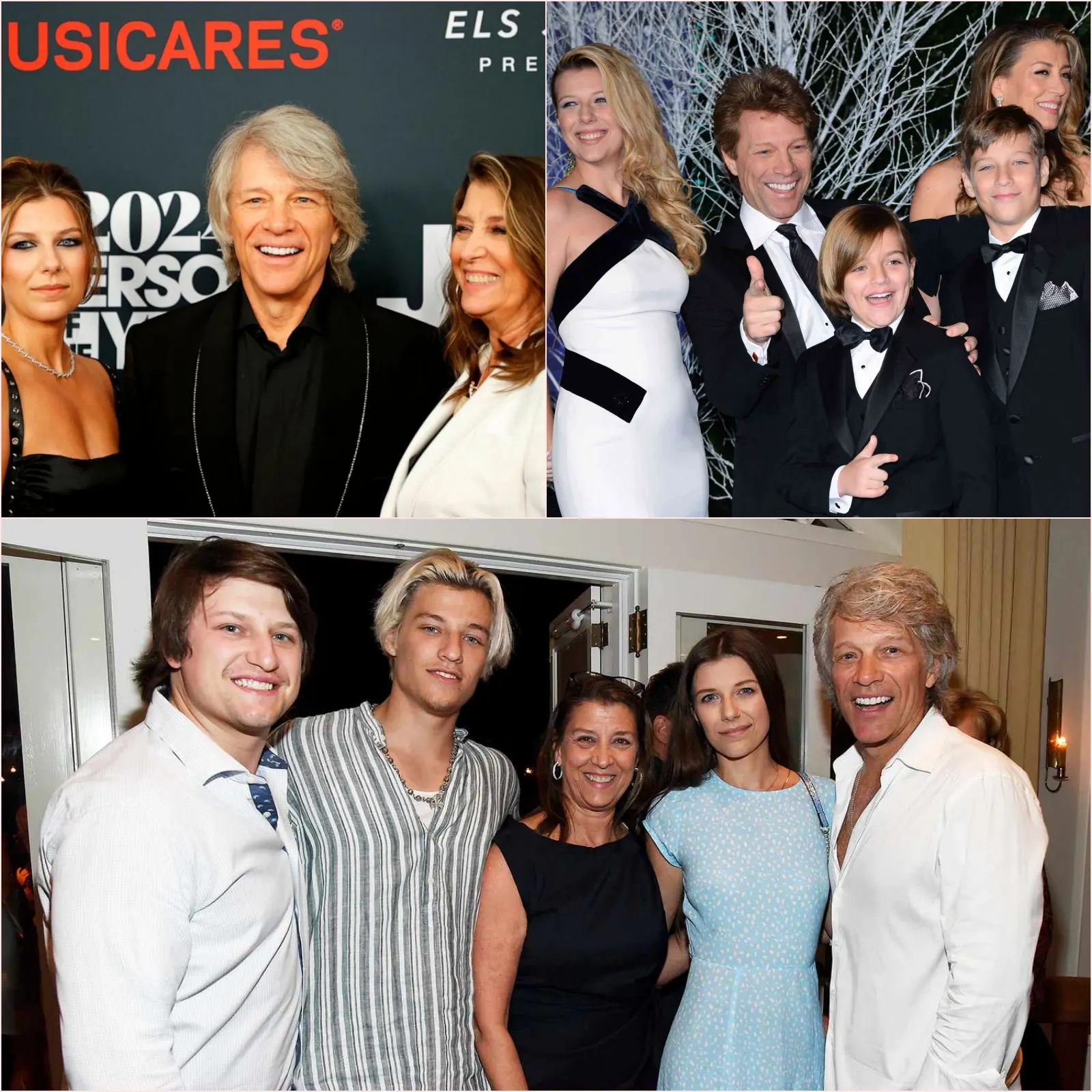Beyond the Spotlight: Jon Bon Jovi’s Emotional Reflection on 75 Years of Love, Legacy, and Life’s True Triumphs

In a rare, deeply emotional interview that quickly captured global attention, Jon Bon Jovi opened up with a raw honesty fans had never witnessed before. The legendary rock icon — known for his anthems, his activism, and his unshakable presence on stage — left audiences stunned not with music, but with vulnerability.
Approaching 75, Jon didn’t reflect on sold-out tours, platinum records, or the decades he dominated stadiums across the world. Instead, he revealed the man behind the legend: a devoted husband, a fiercely proud father, and a soft-hearted grandfather whose greatest victories have nothing to do with fame.
The interview became an unexpected testament to what truly matters — and a moment that resonated far beyond the world of rock and roll.
A Lifetime on Stage — But a Heart Anchored at Home
For more than four decades, Jon Bon Jovi defined an era. With an unmistakable voice and a string of hits that shaped generations — “Livin’ on a Prayer,” “Always,” “Bed of Roses,” “It’s My Life” — he built a legacy few artists will ever match.
But he says the spotlight was never the anchor of his life.
“That was my job,” Jon shared softly. “My real life began when I went home.”
He spoke with warmth and gratitude as he described his wife, Dorothea, his partner since their teenage years. While the world saw a rock superstar surrounded by fame, Jon said his truest stability and strength came from the quiet presence of the woman who’d been with him from the beginning — before arenas, before awards, before the name Bon Jovi became iconic.
“She didn’t fall in love with Jon Bon Jovi,” he said. “She fell in love with Jon.”
From Rock Star to Proud Father: “They’re My Greatest Achievement”
During the interview, Jon reflected on raising four children who grew up watching their father conquer international stages yet consistently choose family first.
He laughed when recalling moments of chaos: homework at the kitchen table, late-night conversations during tours, and juggling the unpredictable schedule of a global musician with the steady responsibilities of fatherhood.
“I didn’t always get it right,” he admitted. “But I always showed up.”
He spoke with pride of the adults his children have become — thoughtful, grounded, compassionate — and credited Dorothea for being the “real hero” of the household.
But the most emotional moment came when Jon spoke about becoming a grandfather.
“My heart wasn’t prepared for that,” he said with a smile breaking through tears. “Being a grandfather changes everything. It slows you down… in the best possible way.”
Letting Go of the Persona: “I Don’t Need to Be the Rock Star Anymore”

One of the interview’s most surprising revelations was Jon’s candid reflection on stepping away from the high-octane rock star image that defined his early career.
“I carried that persona for decades,” he said. “But you get older, and you realize the world doesn’t need another rock star. It needs good men. Good fathers. Good partners.”
He spoke of the peace he’s found in no longer chasing perfection or fame.
“When I’m home holding my grandchild,” he continued, “I don’t care who’s calling me a legend. I care that they know me as Pop-Pop, not Bon Jovi.”
This honesty — quiet, humble, and free of ego — surprised fans who had grown used to the confident swagger he brought to every stage. But Jon insisted the evolution wasn’t sudden; it was natural.
“I didn’t lose the rock star,” he said. “I just found the rest of me.”
A Story of Joy, Pain, and Growth: “You Learn More From the Hard Days”
Jon didn’t shy away from acknowledging the difficult moments that shaped him. He spoke candidly about pressures of fame, personal struggles, and times when the weight of expectation seemed unbearable.
“People think the hardest days are the ones when you fall,” he explained. “But really, the hardest days are the ones when you’re trying to stand back up.”
He credited therapy, love, and time with helping him navigate the emotional toll of decades in the public eye.
“Growth doesn’t happen on the stage,” he said quietly. “It happens at home, late at night, when you’re honest with yourself.”
Why This Interview Moved Millions

What made Jon Bon Jovi’s revelations so powerful wasn’t just the content — but the sincerity. Fans who grew up seeing him as a symbol of strength and glamour suddenly saw the human being underneath: a man grateful for his journey, humbled by time, and deeply in love with the life he built.
Comment sections across social media overflowed with emotion:
-
“I’ve loved him for years, but this made me love him more.”
-
“This is what real maturity looks like.”
-
“His honesty hit me harder than any song.”
People weren’t reacting to a celebrity confession.
They were witnessing a full-circle moment — an artist choosing truth over image, connection over legacy.
A Final Message That Captured the World
As the interview came to a close, Jon Bon Jovi left listeners with a line that instantly went viral:
“Fame fades. Music lasts. But family — family is forever.”
These words, delivered with a trembling voice and the calm wisdom of someone who has lived deeply, became the heart of the story.
For fans, it was a reminder that even the biggest legends are human — and sometimes the greatest triumphs aren’t the ones sung under stadium lights, but the ones whispered in the quiet moments of life.
